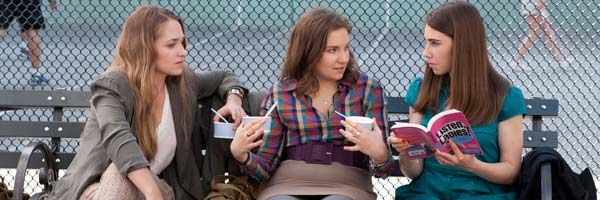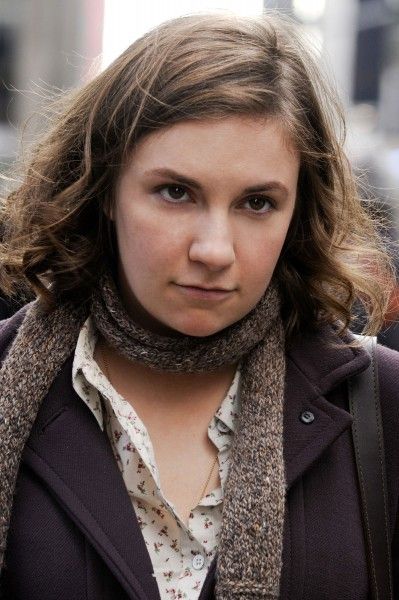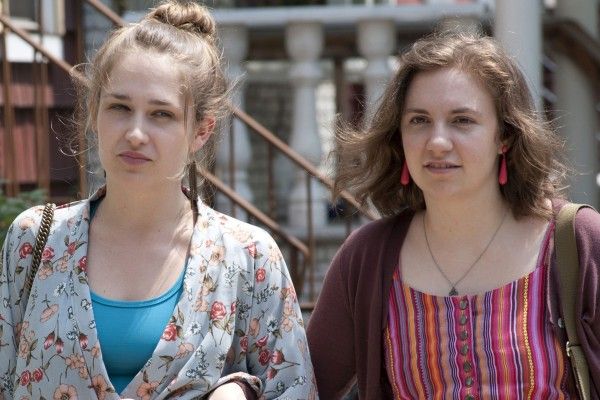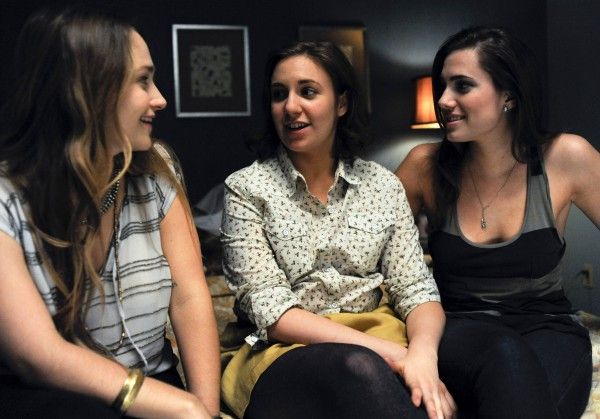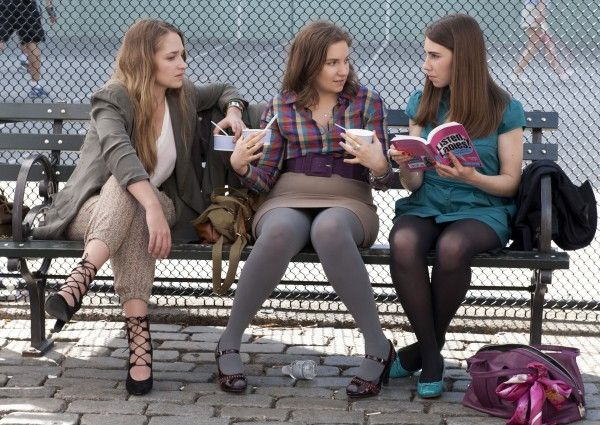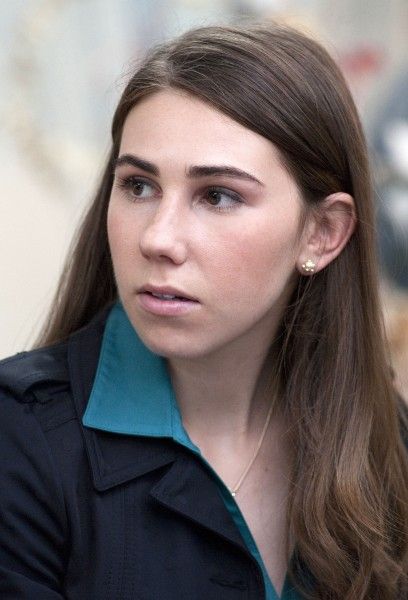Lena Dunham’s indie feature Tiny Furniture put her on the map, as an actress, writer and director. Now, HBO is adding executive producer (along with Judd Apatow and Jenni Konner) to her resume, for the new comedy series Girls, which premieres on April 15th. Following the lives of four very different young women in their 20s, in New York City, Hannah (Dunham), Marnie (Allison Williams), Jessa (Jemima Kirke) and Shoshanna (Zosia Mamet) are trying to figure life out. Even with all of the humiliations and triumphs, they’re still not sure what they want, from boys, from each other or from themselves, and things just aren’t getting any clearer.
During the HBO portion of the TCA Press Tour, co-executive producers Lena Dunham and Judd Apatow talked about how close these characters are to real life, what it’s like to produce a show for HBO, balancing this often awkward and embarrassing journey with some hope for the characters, and how, as the series progressing, all of the characters will be equally punished. Apatow also said that they would see if there’s an idea worth doing, before making a decision about Bridesmaids 2. Check out what they had to say after the jump:
Before reading the interview, here's the trailer for the show:
Question: Lena, how close did you get to this character, in real life? Was there a point where you were in New York and didn’t have money and didn’t know what you were going to do?
LENA DUNHAM: Really close. It’s closely based on my own experience of getting out of college and not having a sense of whether I would ever get to do the thing I wanted to do, and I was really miserable. I was working in a baby clothes store, and was just excited that I got free cookies in the afternoon. It was a really confusing, frustrating time, and I saw a lot of my friends going through the same thing, but it didn’t feel like it was being reflected back at us. I’ve always been someone who feels better, if I see what I’m going through in a movie. So, I really wanted that for me, and for other people.
Did you feel you had the writing talent to make it work, eventually?
DUNHAM: No. I remember asking my mom, “Do you think that I will ever have enough money to live outside of your house?” And she would be like, “You just never know.”
What sensibilities and comedic rhythms did you each bring to this project, within the creative process?
JUDD APATOW: I loved Tiny Furniture. I was given a DVD of it. I didn’t know anything about it, and I didn’t know Lena wrote it. I didn’t know her name. I didn’t know it was her family. I just saw the movie, and then I saw in the credits, “Oh, she did all of this, and that’s her family?” I’m a big fan of doing personal storytelling, so when we started this show, just in terms of sensibilities, the only thing that I preached, having worked on The Larry Sanders Show and Freaks and Geeks, was that we only have 27 minutes to tell these stories. It’s a little more compact, and we have to get to it and have some fun, along the way. You do have to change the pace of it when you have a limited amount of time, as opposed to my movies, which are the length of Lawrence of Arabia.
DUNHAM: I think you would be surprised to learn that a lot of what Judd brought to the show was some of the most emotional, connected, feminine content. You’re going to watch the show and go, “That handjob joke was Judd’s. That crying girl was Lena’s.” But, flip it. I feel like I just brought my desire to share my shame with the world, and am comforted by how these personal experiences can feel really universal. I love flawed female characters, duking it out.
Lena, how does producing a show for HBO compare to making an indie movie?
DUNHAM: It’s decidedly different. But, the thing that was amazing was that I was expecting to go in and be totally overwhelmed by this new machine and these new collaborators, and it actually felt as personal and understanding as making a movie with my mom and my sister. I just didn’t have to buy the pizza. That was the incredible difference. I always tell the story where, the first day, I was so scared, when we got to set. We were shooting on a big soundstage. I shot in my own bedroom, and now this was a bedroom that had been built to resemble my bedroom. It was all very confusing and Being John Malkovich-y. And then, I got into the bed, on the New York soundstage, and they sound three alarms to let you know that it’s time to shoot. I didn’t know that, so the three bells rang, and I was like, “Thank god, there’s a fire drill. I don’t have to do this. I can leave right now.” But then, two takes in, it had the same comfort. It’s a very communal vibe, on set. People are always bringing their daughters to work.
How do you balance this journey with some hope for these characters?
DUNHAM: I think we’ve all been really conscious of making sure that it’s clear that they’re trying their hardest and that they make mistakes, but that they’re also working toward something. It’s a two-steps forward, one-step back situation. They do need to grow up. That’s what the show is about. It’s about that effort to change.
APATOW: All along, we’ve thought that it’s important that you realize that it’s okay to be annoyed by these people, and that they’re making terrible mistakes. There’s a sense of self-entitlement. They’re immature. It is every disaster that happens before you figure out your life.
Judd, the last two shows you did were beloved creative endeavors that the networks didn’t necessarily know what to do with. Have you been tempted to come back to TV before now? What was it about both Lena and HBO that sort of made you say, “Okay, I’m going to do this”?
APATOW: Well, this is the first time I’ve done television since 2001 or 2002. I really wasn’t interested. I was hurt. I was wounded and sad, from my television experience. The only good television experience that I ever had was with HBO, working on and off throughout the run of The Larry Sander’s Show. So, I knew HBO was the best place to be, but I never had my own idea for a show. Actually, I did have an idea once, but I couldn’t get the actor to do it. So, when I heard that Jenni Konner was working on this with Lena, and Jenni and I worked on Undeclared and other projects together, and Sue Naegle was my agent many years ago, I thought, “These are friendly people who will be nice to me and not hurt me,” which is the main thing I’m concerned about, generally. And then, what they were scheming seemed right up my alley. I love underdogs, and people making awful mistakes. There’s also a female geekdom to the show that I appreciate. So, I thought this would be fun, and it’s been truly the best experience that I’ve had.
Did you find there were certain things you missed about doing a TV series versus doing all the movies you’ve done?
APATOW: This is much easier because I do so little. Lena and Jenni have done an amazing job, running the show, and I’ve been able to godfather, and give notes and advice and whatever wisdom I have left. When I did Freaks and Geeks and Undeclared, I put so much into it that, I wound up in the hospital, so it’s nice to not have to do that.
How does it feel to win a movie award for a film as successful as Bridesmaids, and yet you’re having a problem getting Bridesmaids 2 made?
APATOW: Well, we’re still promoting Bridesmaids 1. When the fog clears, we will see if there’s an idea that’s worthy of doing it. We don’t want to be people who make something just to make it. It would be nice to have an idea. People like to set up projects without thoughts. It’s not, “Do you know how much money we could make if we did another one?” That usually leads to Jaws 3D.
Lena, did you know, from the beginning, that this was something you also wanted to act in as well?
DUNHAM: Well, it’s funny. I quit acting when I was 11 because I was cast as a bouncing ball in Alice in Wonderland, and I felt slighted and wounded. And then, when I started writing screenplays, I kept writing these characters who were essentially versions of myself and I thought, “I don’t know who else is gonna want to do this. I guess I’ll play it.” I pretended that it wasn’t an interest of mine, but it was great because this process of making the show was the first time I realized that I do get something out of acting that I don’t get out of the rest of the process. It’s cathartic. It’s connected. It’s an adrenaline rush. I’m sure there are a lot of more technically gifted actresses than I who could nail it, but this character is really close to me, and there’s a shorthand I have with her that, to sound really hippy-dippy, makes it a real pleasure to play that part. I did know, from the beginning, that I was gonna do it. Previous to that, I made two features, and both times it had been a frustrated accident that I was in them, which is, in hindsight, total denial of my dreams of being a star. That’s a joke.
You’re the creator of this show and one of the writers. Why didn’t you spread out some of the more abject humiliations that seem to all be heaped on your character?
DUNHAM: That’s a wonderful question, and it’s something I’ve been discussing with my therapist. I always say that you could place two decisions in front of my character, and someone could be say, “That is the right choice, this is the wrong choice. That one leads to delicious candy and bunnies, and that one is you in a fire,” and she would be like, “What?” She has no clue. It’s almost a little stylized, in a certain way. But, if you continue to watch, other characters will be equally punished.
Girls premieres on HBO April 15th

